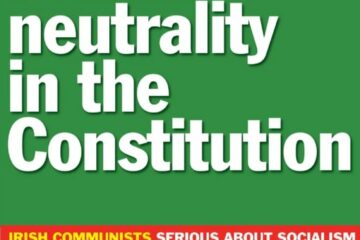Statement by Dublin District, Communist Party of Ireland, 7 February 2016
The Report of the Joint Committee of Inquiry into the Banking Crisis, recently published, says that “no one single event or decision led to the failure of the banks in the lead in period to the Crisis, but rather it was the cumulative result of a series of events and decisions over a number of years.”
This, we believe, is false, because there was one single event that changed the whole nature of banking in Ireland, which gave rise to the cumulative effects that led to the banking crisis—and that was the adoption of the euro.
Irish banks’ traditional funding from deposit accounts was changed. Commercial banks, because of the anticipation and adoption of the euro, began to get a large part of their funding through wholesale external borrowing, where they took out large loans from mainly German, French and other foreign banks and financial markets.
The reason Irish banks were able to take out these large loans around this time has to do with Ireland becoming part of the euro, which halved the real interest rate—making it cheap to borrow money, and by removing exchange-rate risk.
New lending practices, mainly started by Anglo-Irish Bank, saw their market share grow from 3% to 18% in a decade and its loan portfolio grow at an average rate of 36% per annum (8% being the norm), which would see Irish banks becoming more and more open to risk, because the main sector for lending was in property development. The two largest banks, AIB and Bank of Ireland, would soon follow the business models of Anglo-Irish to reap the high profits that came from this risky lending.
The bigger picture
The euro in itself is a central part of the EU project of state-building. It was probably the pinnacle of the European superstate project, because since then the single currency has failed to integrate and harmonise the various European states through tacit consent. What has since unfolded has been a transfer of wealth from the peripheral to the core states, and a transfer of wealth from the majority of working people to the minority of the financial and industrial elite.
The idea that “no Irish bank is to fail” came straight from Europe, because in February 2008 the Department of Finance wrote that to “provide an open-ended legally binding state guarantee would expose the Exchequer to the risk of significant cost and should not be regarded as part of the tool kit.”
This clearly shows that the idea that the banks would have run out of money was a con, given that the Central Bank had put in place sufficient measures to ensure that all banks would have opened on Monday 30 September 2008, and no default of any bank would have taken place that day.
The Irish people had a gun put to their head twice by Europe: first of all to save the banking system, and then to agree to a bail-out package that ensured that Ireland would for ever be in debt to Europe.
Aside from our own cohort of bankers, developers and politicians looking after their own interest in giving a blanket guarantee, it was the euro and the whole EU project that was in jeopardy; and that is why banks such as Anglo-Irish and Irish Nationwide Building Society, which were the developers’ banks, were saved. It was to stop a Europe-wide systemic currency crisis, where the biggest European banks and their owners and shareholders would have suffered huge losses if certain banks were not guaranteed.
What has resulted has been a Europe-wide economic crisis, where working people have picked up the tab for the wealthy speculators through austerity policies. What it has shown is the weakness of the euro in an area that is not an optimal currency area, the domination of the EU over our own governments, and the willingness of the financial and political elite, the internal and external troika, to sacrifice the people of Ireland, and wider Europe, to protect and save their own interests.
The crisis that ripped through the euro zone was not isolated. Other states, such as the United States, Britain, and Iceland, went through a similar crisis, where the financial industry crippled their economies. It was an interconnected crisis of capitalism, where finance dominated domestic economies to stimulate growth by stringing debt to domestic banks.
Although the causes of the financial crisis varied around the world, the capitalists’ cure was and is the same: the people pay off the debts of big business through wage cuts and austerity, and business reaps the rewards and plans its next move.
The Dublin District of the CPI urges people to think deeply and critically about the role and nature of the EU in relation to debt and austerity, which has besieged our nation and our people. We cannot continue to harbour the illusion that we can democratise the EU. You cannot change from within something that was designed from its inception to be nothing but an instrument of capitalism.
Capitalism does not need democracy; and the people don’t need capitalism and its institutions!










